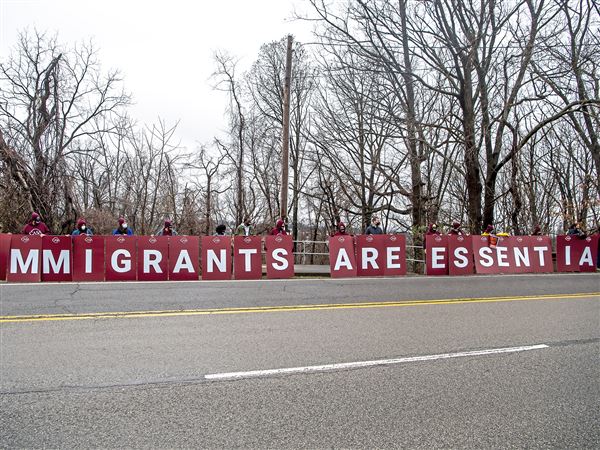WASHINGTON -- "Speaking is difficult, but I need to say something important," former Arizona Rep. Gabrielle Giffords told her onetime colleagues. "Violence is a big problem. Too many children are dying. Too many children. We must do something.
"It would be hard, but the time is now. You must act."
Her words, read from a single, handwritten page, were among the camera-ready scenes as the Senate began hearings on gun control Wednesday, in a charged atmosphere with each side reaching for emotional force.
The former congresswoman, still disabled after being shot in the head two years ago at an outdoor appearance in her Tucson district, spoke for barely a minute, breaking the traditional protocol that calls for senators to make opening statements before witnesses give testimony.
Then she made her way from the room, leaving behind her husband, retired Navy Capt. Mark Kelly, a former space shuttle astronaut. In a reminder of the pervasiveness of gun violence in this country, Mr. Kelly informed senators that three people had just been wounded by a gunman at an office building in Phoenix.
At the opposite end of a long, polished table sat the lead witness for the opposing side, Wayne LaPierre, the National Rifle Association's executive vice president. He and Mr. Kelly barely interacted, save for a brief handshake at the hearing's close. The formal politeness of the Senate Judiciary Committee hearing room did little to mask the continued wide division over gun legislation.
Democrats called for stronger laws to limit the sale of guns; Republicans insisted that existing laws were being under-enforced and questioned the need for new ones.
The shootings in Tucson and Newtown, Conn., "are terrible tragedies," said the panel's senior Republican, Iowa Sen. Charles Grassley, but they "should not be used to put forward every gun control measure that has been floating around for years."
Offstage, some senators have begun to move toward accord on at least one part of the gun package pushed by President Barack Obama -- a measure to tighten the current background checks system for gun purchases. Sen. Chuck Schumer, D-N.Y., who is crafting a background checks bill, said at the hearing that he is "having productive conversations with colleagues on both sides of the aisle, including a good number with high NRA ratings."
That agreement does not extend to the NRA itself, as Mr. LaPierre made clear. "Law-abiding gun owners will not accept blame for the acts of violent or deranged criminals," he said. Later, he specifically rejected the idea of universal background checks for gun purchases. "My problem with background checks is you're never going to get criminals to go through universal background checks," he said, prompting a heated exchange with Illinois Sen. Dick Durbin.
"Mr. LaPierre, that's the point," the senator interjected. "The criminals won't go to purchase the guns because there will be a background check. We'll stop them from the original purchase."
Mr. LaPierre was more amenable to prosecution of straw purchasers -- people who buy guns for others, most often those prohibited from buying guns themselves. Judiciary Committee chairman Patrick Leahy, D-Vt., and Mr. Durbin introduced a bill last week to combat gun trafficking. Sens. Mark Kirk, R-Ill., and Kirsten Gillibrand, D-N.Y., unveiled another gun trafficking proposal Wednesday.
While prospects for expanded background checks and tougher trafficking laws have grown, prospects for an assault weapons ban, eagerly sought by some gun control advocates, seem dim.
Mr. Leahy notably did not endorse the ban in his comments during the hearing. Nor did Mr. Kelly, who instead called for a "careful and civil conversation about the lethality of firearms we permit to be legally bought and sold in this country," while reminding senators of the toll that mass shootings have taken.
"Gabby's gift for speech is a distant memory," Mr. Kelly said. "She struggles to walk, and she is partially blind." But "we aren't here as victims," he said. "We're speaking to you today as Americans."
He and Ms. Giffords "have our firearms for the same reasons that millions of others have guns, for hunting and target shooting," he said. "But rights demand responsibility." After the hearing, the couple met with Mr. Obama at the White House.
Republican foes countered the statements favoring the ban with testimony by Gayle Trotter, a senior fellow at the conservative Independent Women's Forum, who argued that owning a semi-automatic rifle for self-protection was an important right for women. Ms. Trotter cited an Oklahoma mother who had fended off an intruder by using a 12-gauge shotgun, drawing a retort from Sen. Sheldon Whitehouse, D-R.I., who noted that the proposed ban would not prohibit that weapon.
The panel plans to hold two more hearings on guns, including one focused specifically on Second Amendment issues.
Mr. Leahy, at the hearing's close, said he hopes to begin committee votes on legislation next month. Senate Majority Leader Harry Reid, D-Nev., who has often supported the NRA in the past, said Tuesday that he expected a bill to clear the committee and made clear that he would not block it from the Senate floor.
First Published: January 31, 2013, 5:00 a.m.














